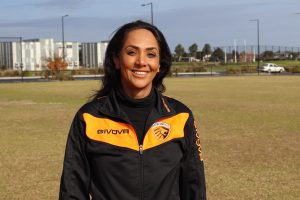Migrant soccer coach ‘bending it like Beckham’
Palwashi Aslami has an abiding passion to encourage women and girls from culturally diverse communities, especially those from her own Afghan community, to play sport.
As an Under-14 girl’s soccer coach with the Barton FC club in Melbourne’s south-east she is shaping a generation of aspiring players. And, informed by her own upbringing, she has also launched a campaign to attract more women and girls to join the game.
 Palwashi’s own journey is an extraordinary story of endurance and commitment in overcoming adversity and intransigent cultural boundaries.
Palwashi’s own journey is an extraordinary story of endurance and commitment in overcoming adversity and intransigent cultural boundaries.
“I know from my own experience how difficult it can be for girls from some cultural backgrounds to join in sport. So, I’m committed to developing pathways for young girls to progress in our sport,” she said.
Palwashi was born in Kabul, Afghanistan, in 1982 during the era of Soviet occupation. At the time, life in Kabul later became increasingly unsafe as the Mujahadeen gained ground against Soviet forces.
Following threats by war lords, Palwashi’s father, a businessman, decided to take his family to safety.
Palwashi and her family made a long and treacherous journey on foot and by truck to Iran. Even though they arrived with just the clothes on their back, the family finally felt safe.
Living in Iran, whilst free from the conflict in Afghanistan, had its challenges. The family did not speak Persian, and the girls in the family we not allowed to attend school.
“My father was opened minded and believed firmly that his daughters should have the same education and opportunities as his sons,” Palwashi said.
“So, after a year in Iran, we moved to Zimbabwe, where my father had been running an import export business to and from Afghanistan.
“We spent 11 years in Zimbabwe, and my father set up a successful business. We all attended all attended good schools,” she said.
It was in high school that Palwashi’s passion for soccer was nurtured – although it was a passion that had to be hidden from her mother, who was against her daughters playing sport.
“I ended up being the sports captain of my high school,” Palwashi said.
“One day I was kicking a ball around and a soccer coach saw me and asked me to join the team. Mum didn’t want me to do it, but Dad said: ‘just do it anyway’.”
Palwashi says her circumstances mirrored the character of Jesminder “Jess” Bhamra in the movie “Bend it Like Beckham” which follows the trials of an English Sikh girl who is passionate about football, but who’s parents do not support her interest.
“That earned me nickname ‘Bend it like Beckham’,” she said.
“I played for 16 years at school and in clubs and eventually was up for national team selection.”
At the time, tensions were rising between black and white Zimbabweans. Palwashi was selected in the national women’s team for the first time to play Mozambique.
“But because I was not a black African, I never actually played for the team,” Palwashi said.
As political tensions rose and non-Africans were being evicted from their properties, Palwashi’s family was again forced to emigrate.
“We had the option of mobbing to London or to Australia. My dad liked the open spaces in Australia and my Mum had family who had lived here for thirty years – so we came to Australia in 2003 and started a new life.
After a settling in period, Palwashi again felt the draw of the ‘beautiful game’ and began playing for Ashburton Women’s Soccer Club in 2005.
After she started working at Telstra in 2004, a colleague invited to the club. But she lived in Dandenong and had no car. She cycled and hour to and from training twice a week.
“Coming home in the dark was the worst but I had to do it somehow,” Palwashi said.
Work commitments and her father’s ill health forced her to stop playing after a couple of years, but she returned to the game as a coach at the Oakleigh Cannons.
Palwashi took time off again when her son Yusef was born and but returned to coaching at Alamein FC as assistant coach of the Under 12s and at the Casey Comets.
She now has her coaching qualifications and is leading the effort to give women and girls the opportunity to play at Barton FC.
Palwashi says the ‘Matilda’s effect’ has had an impact on the club.
“We had dinner evenings where we showed the Matilda’s matches in the club house and we had girls and their families come along,’ she said.
Barton would be a reasonable template for a multicultural, community-based club.
“We are trying to build a community club that is welcoming to everyone – girls and boys and people from all communities,” Palwashi said.
Although mostly Afghan, Barton has players and supporters who Australians, Albanians, Indians, Pakistanis, Ugandans, Mauritians, South Africans and others.
“We have sponsorship arrangements for families who maybe had four or five kids and can’t afford the fees,” Palwashi said.
“We are about developing our kids as people as well as players. We want to get them involved in the future of the club and maybe themselves become coaches.
“In the end this is all about community. It’s about coming together to share something we enjoy and something that unites us,” she said.












